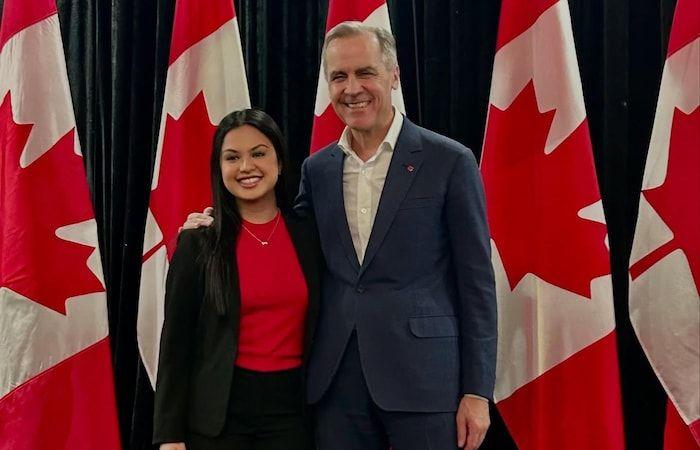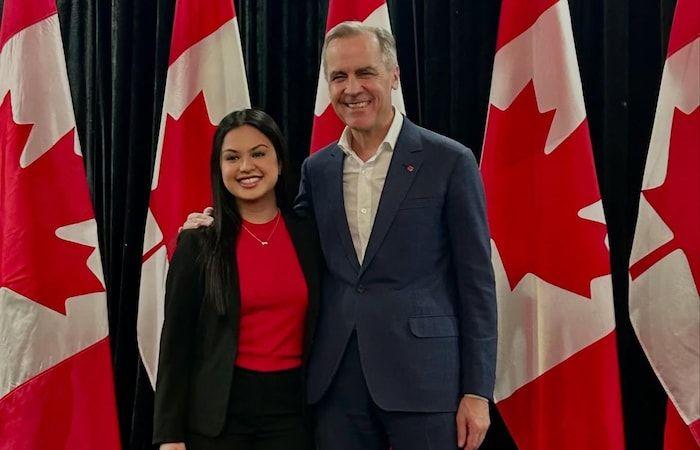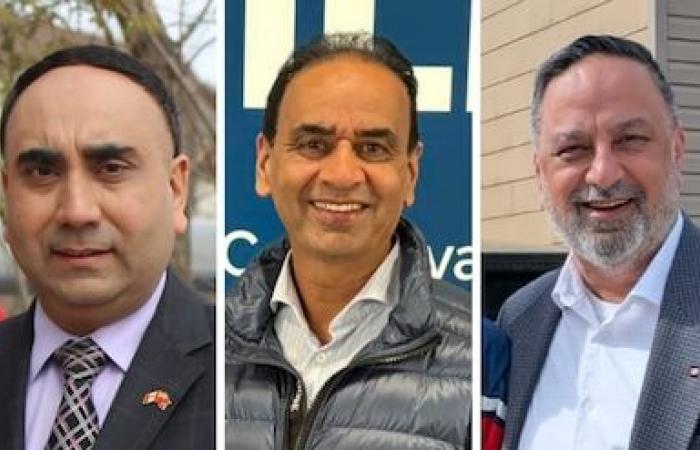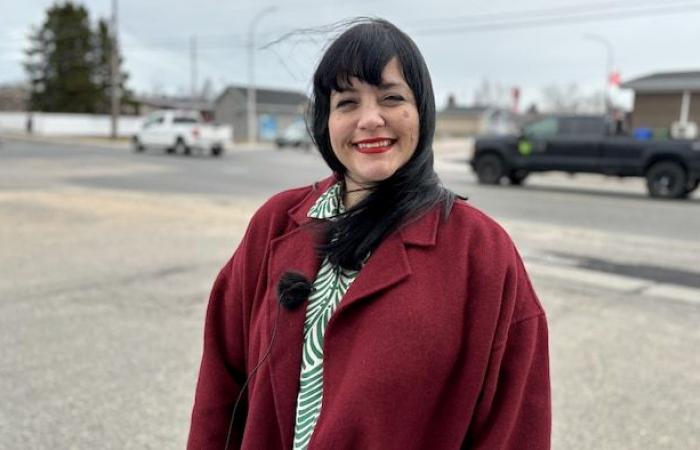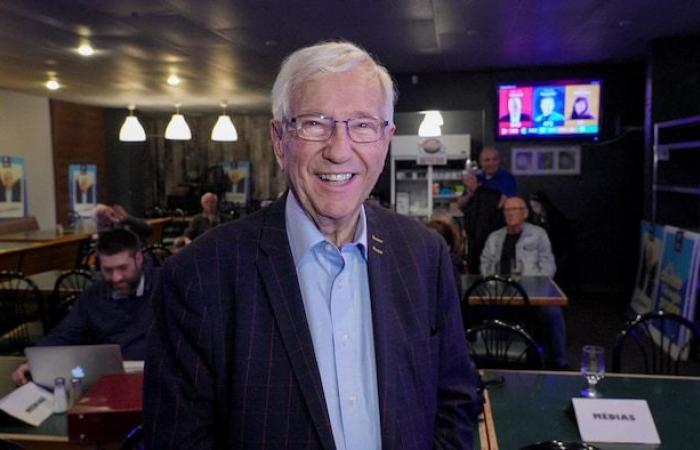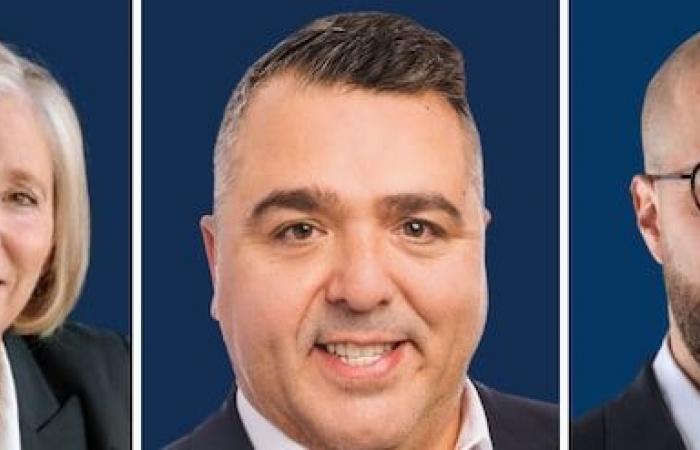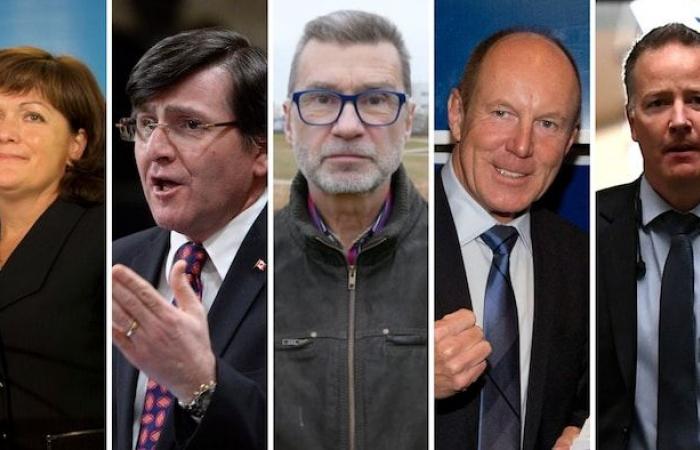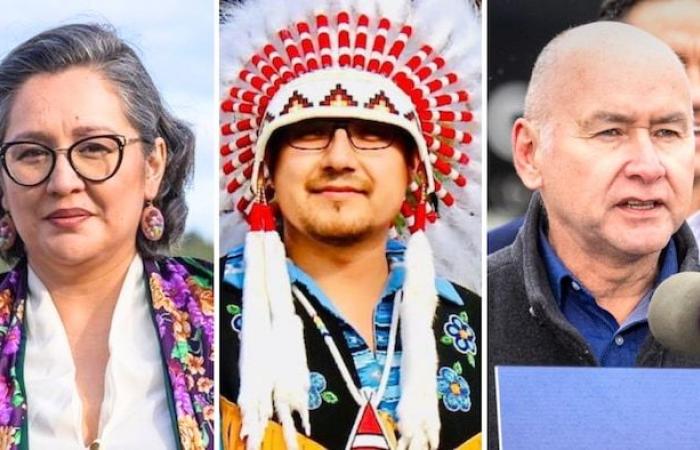A new 23 -year -old elected official, another 83 -year -old, three former professional sportsmen, six deputies appointed Gill and several records broken. Here are eight things to know about the new parliament.
1. MPs born after the year 2000
At least three deputies born after the year 2000 will sit on liberal benches as soon as the parliament returns.
At just 23 years old, Amandeep sodhi becomes the youngest elected representative of the 45th legislature. Born in November 2001, the new Brampton-Center MP won the country’s seventh race in the country.
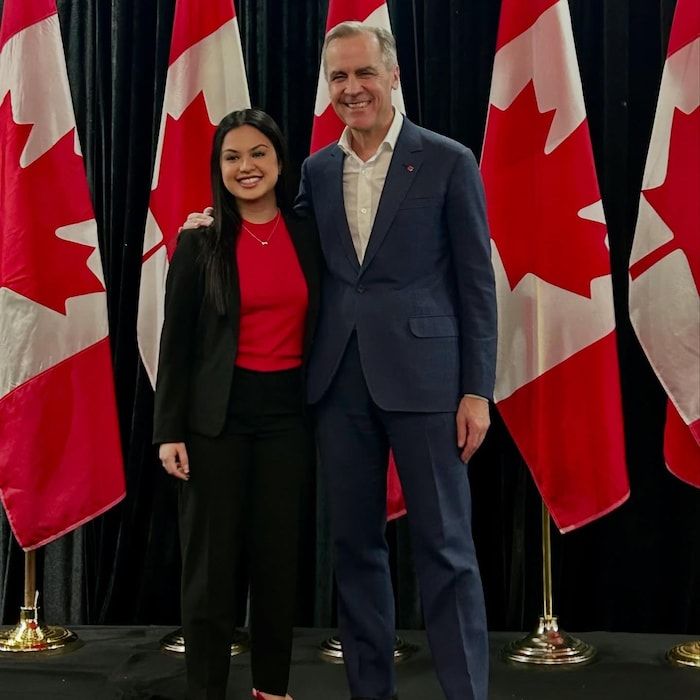
Open in full screen
The new MP for Brampton-Center, Amandeep Sodhi, with Liberal leader Mark Carney.
Photo : Essayr / A standing in Screal
She will be accompanied by Fares Al Soudelected to Mississauga, who blew her 25 candles during the campaign, as well as Jake Sawatzky, 25 years old, elected in New Westminster – Burnaby – Maillardville.
They could be joined by the liberal Tatiana August24, who could also enter the House if the judicial recount invalidates the 44 votes which separate it from the outgoing blocist deputy, Nathalie Sinclair-Desgagné.
At the other end of the spectrum, the liberal Hedy Fryre-elected in Vancouver-Center, retains its title of dean of the room at 83 years old. Between her and the youngest elected official, 60 years ago, 3 months and 14 days – 2,021 days – apart.
2. Six gill on the benches
In this 45th legislature, the name Gill
will resonate particularly strong. No less than six deputies in the country, five conservatives and a blockist, carry this surname.
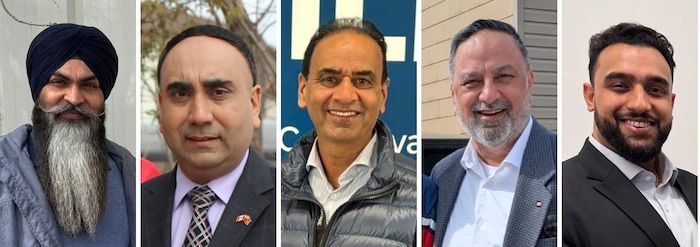
Open in full screen
Amanpreet Singh Gill (Calgary Skyview, Alberta), Amarjeet Gill (Brampton-Ouest, Ontario), Dalwinder Gill (Calgary McKnight, Alberta), Harbinder Gill (Windsor-Ouest, Ontario) et Sukhman Gill (Abbotsford—Langley-Sud, Colombie-Britannique)
Photo: Social networks of candidates
We count the Conservatives Amanpreet Singh Gill (Calgary Skyview, Alberta), Amarjeet Gill (Brampton-Ouest, Ontario), Dalwinder Gill (Calgary McKnight, Alberta), Harbinder Gill (Windsor-West, Ontario) and Sukhman Gill (Abbotsford-Langley-Sud, British Columbia).
Marilène GillMP of the Quebec Bloc, also retains its seat in Manicouagan, adding a Gill
to the whole.
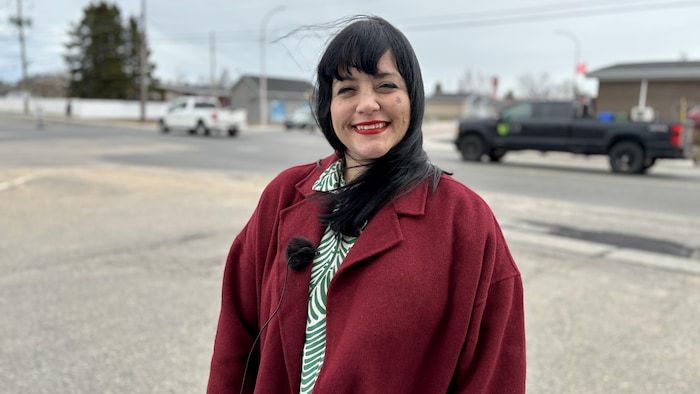
Open in full screen
Marilène Gill won a fourth term as a member of Côte-Nord-Kawawachikamach-Nitassinan.
Photo: Radio-Canada / Charles-Étienne Drouin
Another Mr. Gill could also be added to the list if Paramjit gill (Milton-Est-Halls Hills-South, Ontario) returns to its headquarters after a judicial stripping.
This situation risks sowing a little confusion during votes in the House of Commons, where the president traditionally calls each deputy by name. In this case, the presidency must specify the district of the elected official to avoid any mistake.
3. Several records for Louis Plamondon
Re -elected in his constituency now called Bécancour – Nicolet – Saurel – Alnôbak, Louis Plamondon has been, since April 3, the deputy having served as long as the municipalities without interruption.
With his 13th victory in a federal election, he also became the deputy having been elected the greatest number of times without interruption, with equality with the former Liberal Deputy Prime Minister Herb Gray.
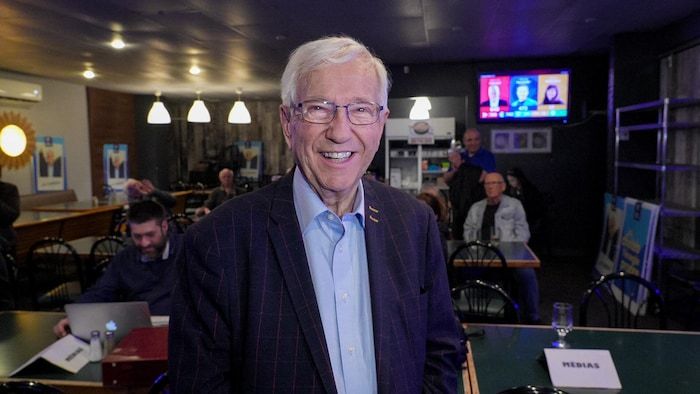
Open in full screen
The blocist Louis Plamondon was elected for a 13th time on April 28 in Becancour – Nicolet – Sorel – Alnôbak.
Photo : Radio-Canada / Felix Desroches
On November 23, it will also hold the greatest number of years of total service spent in the House. The current holder of this record is former Prime Minister Wilfrid Laurier, who has accumulated 44 years, 11 months and 5 days of service. However, this period was divided into two periods between 1874 and 1919.
Louis Plamondon was elected for the first time in the 1984 election under the banner of the Progressives-Conservatives of Brian Mulroney. He then went on the side of the Quebec Bloc in 1990, after having sat as independent and founded the Bloc Québécois alongside six other deputies.
The blocist holds another record: that of the shortest mandate as president of the House of Commons. On September 27, 2023, he took the interim presidency after the forced resignation of Anthony Rota, who had invited an ex-Ukrainian soldier who fought with the Nazis. His mandate will only have lasted six days.
4. Three professional ex-sports people
The Conservatives also welcome a handful of new deputies from the world of sport.
Helena Konanz (Similkameen –kanagan-Sud-Kootenay-Ouest) is a former player of professional tennis of international level who participated in tournaments like theU.S. Open et Wimbledon.
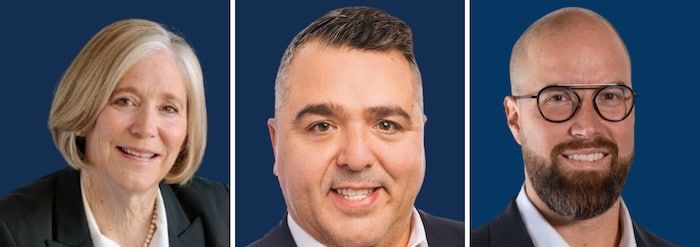
Open in full screen
Helena Konanz, Jason Groleau and Gabriel Hary.
Photo: Canada Conservative Party
Two new conservative deputies of Quebec who have links with the Junior Maritime Hockey League join it.
Jason Groleau is a former member of the Hull Olympics (now Olympic Gatineau) and the Tigers of Victoriaville. Gabriel Hardy was previously personal coach for the Quebec ramparts.
5. Defeated deputies then re -elected
Five deputies return to the House of Commons after losing their headquarters in previous elections.
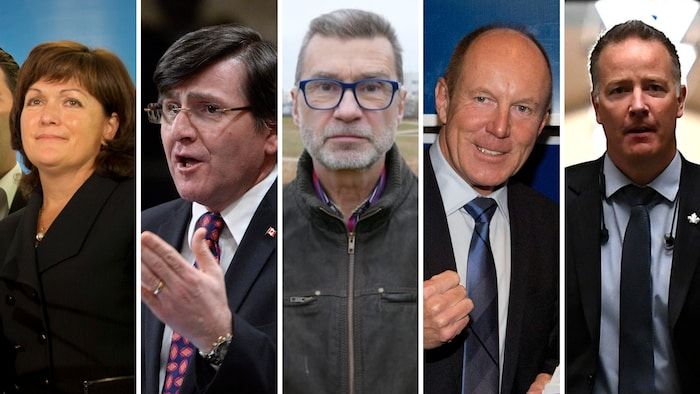
Open in full screen
Linda Lapointe, Costas Tegakis, Doug Eyolfson, Kerry Diotte et Stephen Fuhr.
Photo: Canadian/Radio-Canada Press
-
Beautiful LapointeLiberal in Rivière-des-Mille-Îles, found the headquarters she occupied from 2015 to 2019. She presented herself and lost against the Bloc Québécois in 2019 and 2021.
-
Costtas reprimandedConservative in Aurora – Oak Ridges – Richmond Hill, returns after several unsuccessful attempts in this same constituency which he had won in 2011, then lost in 2015, 2019 and 2021.
-
Doug EyolfsonLiberal in Winnipeg-Ouest, returns after losing in 2019 and 2021, having been elected in Charleswood-ST. James – Assiniboia – Headingley in 2015.
-
Kerry DiotteCurator of Edmonton Griesbach, returned to the seat he owned from 2015 to 2021. He had lost by some 1,500 votes in 2021 against the neo-democrat Blake Desjarlais.
-
Stephen FuhrLiberal in Kelowna, returned after losing in 2019 his seat of the district of Kelowna – Lake Country, which he won in 2015.
6. First mandate for almost a third of deputies
The liberals and the conservatives, who both increased their number of seats, welcome a large cohort of new deputies. A total of 112 on 343 deputies begin their first mandate, or 32.7 % of the deputation.
For the Liberal Party, these 66 new faces represent 39.5 % of the caucus. For conservatives, it is rather 30.6 % of the caucus which is made up of new elected officials, or 44.
The Bloc Québécois, meanwhile, welcomes two new faces, Patrick Bonin In Repentigny and Alexis Deschênes In Gaspésie-Les Îles-de-la-Madeleine-Listuguj. Nor the NPD Nor the Green Party accept new deputies in their ranks in the House. These three political parties have considerably reduced their presence in the municipalities.
7. Record indigenous representation
For the first time, 12 Aboriginal deputies will sit in the House of Commons, exceeding 11 elected officials in 2015 and 2019.
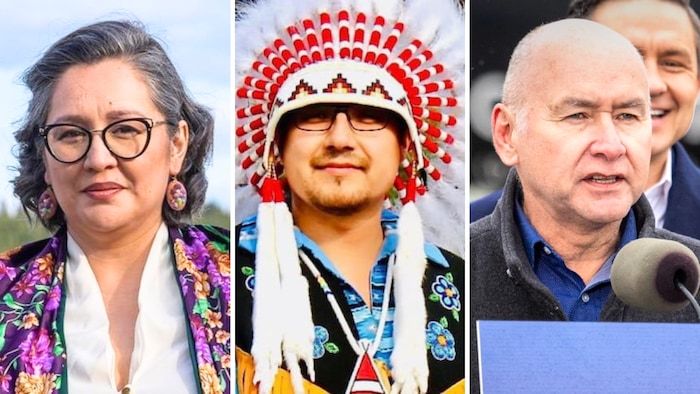
Open in full screen
Mandy Gull-Masty, Billy Morin, Ellis Ross.
Photo : Radio-Canada
Among the newcomers, several indigenous leaders access parliament, including the liberal Mandy gull-masty (Abitibi-Baie-James-Nunavik-Eeeyou), former great head of Eeyou Istchee, who becomes the first woman cries out to represent this vast district of the North Quebec.
In Alberta, the curator Billy Morin (Edmonton-Nord-Ouest), ex-chief of the nation shouts of Enoch, enters the chamber, just like Ellis Ross (Skeena-Bulkley Valley), former chief of the Haisla nation, who delighted a neo-democratic bastion in British Columbia.
Manitoba also sees a change of guard: the liberal Rebecca Chartrandwho identifies himself like Anishinaabe, Ininew, Dakota and Métis, defeated the outgoing neo-democratic deputy Niki Ashton in Churchill-Keewatinook Aski.
The Liberal Party also counts Jaime Battiste (Breton Head-Cancer–Anticgon), first deputy mi’kmaw in the country, Buckley Belanger (Desneté -missinippi – rinière churchill), métis de la saskatchewan, etc. Wade Grant (Vancouver Quadra), member of the Musqueam community.
Among the Conservatives, Adam Chambers (Simcoe-Nord) and Marc Dalton (Pitt Meadows – Maple Ridge) are of Métis origin.
The NPD keeps two Aboriginal deputies: Lori Idlout (Nunavut), Inuk and Lawyer, who won a tight race, and Leah Gazan (Winnipeg-Center), member of the Lakota nation of Wood Mountain.
The Bloc Québécois also counts Simon-Pierre Savard-Tremblay (Saint-Hyacinthe-Bagot-Acton), member of the Huronne-Wendat nation.
8. Light increase
After reaching a symbolic summit in 2021, parity continues to increase turtle in the communes. It is now 104 deputies, rather than 103 in 2021, who will sit in the municipalities. Despite the addition of five new seats, the proportion increases slightly by 30.09 % to 30.32 %.
However, women were fewer to present themselves as candidates than in 2021, with 6 % fewer female applications.
On average, since the 2000s, the increase in the number of deputies elected to Canada remains slow, with an increase of only 1.66 % in each election. If this trend continues, it would take up to 50 years, or 12 additional elections, to reach gender parity.
Although this proportion maintains the critical threshold of 30 %recommended by the United Nations, it remains lower than that of countries like Rwanda (64 %) and Mexico (50 %), which widely are ahead of Canada.
With the collaboration of Andréanne Apablaza and Julie-Anne Lapointe

